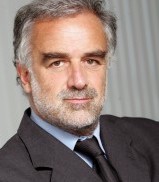Activating Global Law
A review of Butterfly Politics by Catharine A. MacKinnon (Harvard University Press, 2017).
***
Published by The Lawfare Institute
in Cooperation With

A review of Butterfly Politics by Catharine A. MacKinnon (Harvard University Press, 2017).
***
Small actions can have highly complex and large impacts, and Catharine MacKinnon uses this concept, the “butterfly effect,” to explain how critical interventions can produce radical transformation in the gender system. She exposes through 40 years of her legal battles an emerging global normative system confronting sexual inequality. This is my reading of this highly complex book with many possible readings.
That normative system is global in the sense that there is neither national legislation nor an international treaty fully defining it; connections must be affirmatively established, and national and international boundaries are blurred. The normative system described in the book includes the first U.S. Supreme Court decision on sexual harassment as a legal claim against sex discrimination; the U.S. Attorney General Commission report released the same year connecting the consumption of pornography with sexual abuse and the sexualized denigration of women; the Canadian Supreme Court’s groundbreaking embrace of the theory of substantive equality; and international institutions’ recognition of rape as a form of torture and as an act of genocide. It also extends to MacKinnon’s discussion with prostituted women in India about a Swedish law criminalizing those who buy people for sexual use but that does not criminalize those who are bought and sold in prostitution.
The global normative system MacKinnon describes is emerging because it started just a few decades ago and is still developing in many directions. In some of the cases recounted, MacKinnon was the one who presented for the first time the ideas that have become established; in others she remains one of the many voices of protest and dissent. In her own words: “We start impossible post-revolutionary, so radical we can’t possibly be taken seriously, then suddenly we are post-feminism—always too late or too early, ahead of or behind their curve.”
MacKinnon’s analytical method is unique in the legal arena. She describes an “orderly disorder analysis in complex systems of nonlinear dynamics producing difficult to predict outcomes initiated from unexpected small locales.” She connects some dots and suggests the emergence of a new normative system without pretending to be exhaustive. She is exposing a vision to be followed, not a result to be quantified. She is not just recognizing the complexity of the system but is inviting us to embrace it as the norm.
Last but not least, MacKinnon is a legal activist proposing that the law and its institutions could be a vital, continuing part of women’s empowerment. She is well aware that the legal system normally opposes change, but she also understands that it could, with creativity, serve as a means of legitimizing women’s outrage. She affirms that the law and politics of gender inequality are neither simply deterministic, as much as legal realism would have it, nor cynically despairing, as critical legal theory could lead one to believe.
She is also, however, warning us: challenging the settled distribution of power—especially in the real world and particularly when there are uncomfortable consequences—will be punished by the academy. Paradigm smashers or even paradigm questioners are told that they don’t know what they are talking about. She considers that academic freedom is used paradoxically to silence dissent through exclusion and denigration.
The book illustrates how small actions in a collective context can produce systemic changes, an idea that resonates with me. I witnessed this dynamic in my country, Argentina, when the mothers of those who were secretly abducted transformed a simple walk around a monument into the main form of protest again a brutal military dictatorship. A few years later, in 1985, the generals who had led that dictatorship for seven years were in the dock, and I had the privilege of being one of the prosecutors requesting their conviction.
Later, as chief prosecutor of the International Criminal Court, I witnessed how Turkey’s activists, challenging the Israeli blockade of the Gaza Strip, provided jurisdiction to the ICC by registering one of the ships that was part of the flotilla—the Mavi Marmara—in the Comoros, a state party to the Rome Statute. So when Israeli Special Forces boarded the Marmara under the Comoros flag on May 31, 2010, the actions were committed under the ICC’s jurisdiction. Comoros referred the situation to the court and as a consequence the ICC is considering whether to intervene.
The “butterfly” metaphor can animate collective political activism and support advocacy for equality at a crucial time. In the 18th century, Alexander Hamilton, Thomas Jefferson and other activists transformed humanity; they created new software, the U.S. Constitution, and the hardware to implement it. MacKinnon is a 21st-century thinker, one of the few proposing global software that could run on the old national hardware. She is encouraging multidimensional political thinking, precise engagement, principled creativity, imagination, instinct and adaptability: small actions in a collective context producing systemic changes.



